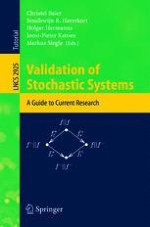2004 | Buch
Validation of Stochastic Systems
A Guide to Current Research
herausgegeben von: Christel Baier, Boudewijn R. Haverkort, Holger Hermanns, Joost-Pieter Katoen, Markus Siegle
Verlag: Springer Berlin Heidelberg
Buchreihe : Lecture Notes in Computer Science
Enthalten in: Professional Book Archive
